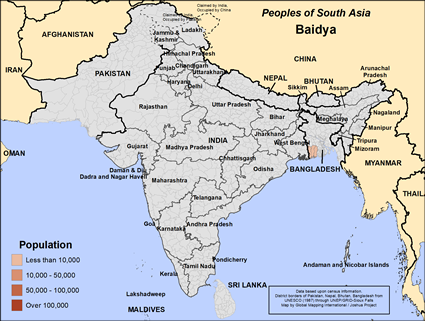Baidya in Bangladesh

Send Joshua Project a photo
of this people group. |

Map Source:
People Group data: Omid. Map geography: UNESCO / GMI. Map Design: Joshua Project
|
| People Name: | Baidya |
| Country: | Bangladesh |
| 10/40 Window: | Yes |
| Population: | 1,100 |
| World Population: | 1,100 |
| Primary Language: | Bengali |
| Primary Religion: | Islam |
| Christian Adherents: | 0.00 % |
| Evangelicals: | 0.00 % |
| Scripture: | Complete Bible |
| Ministry Resources: | Yes |
| Jesus Film: | Yes |
| Audio Recordings: | Yes |
| People Cluster: | South Asia Muslim - other |
| Affinity Bloc: | South Asian Peoples |
| Progress Level: |
|
Introduction / History
The Muslim Baidya people in Bangladesh are part of a small community that historically transitioned from Hinduism to Islam. The Baidya caste, traditionally associated with medicine and healing, has origins in Hindu society. Over time, some Baidya families converted to Islam, while retaining a distinct identity within the Muslim community. The majority of Baidya people remain Hindu.
Despite this religious shift, the Muslim Baidya people have managed to preserve their unique customs and traditions. Their history reflects a blend of Islamic beliefs with cultural practices passed down from their Hindu heritage, positioning them as a distinct group in Bangladesh's social landscape.
What Are Their Lives Like?
The Muslim Baidya people primarily live in rural and semi-urban areas of Bangladesh, where they engage in various occupations, including agriculture, small-scale trade and manual labor. Historically, some members of the Baidya community were known for their expertise in traditional medicine and healing, though modern economic shifts have led many to pursue other livelihoods.
Family and community are central to the lives of the Muslim Baidya people. They typically live in close-knit communities, with extended families residing near one another. Homes are often simple, built from locally available materials such as brick, mud and thatch. Many families are involved in farming, growing rice vegetables and other crops for subsistence and local markets. Education is valued in their communities, although access to quality schooling can be limited in rural areas.
What Are Their Beliefs?
The Muslim Baidya people follow Sunni Islam, with their religious practices centered around the core tenets of Islam, including daily prayers, fasting during Ramadan, and participation in Islamic festivals such as Eid al-Fitr and Eid al-Adha. Mosques play a key role in community life, serving as places of worship and social gatherings.
While they have embraced Islamic beliefs, some traditional practices tied to their Hindu past remain evident. For example, certain folk traditions and rituals related to healing and medicine are still respected within the community. Additionally, the Muslim Baidya retain a strong sense of community identity, often marking life events such as weddings and funerals with unique customs that reflect their historical background.
What Are Their Needs?
The Muslim Baidya people face challenges related to economic development, education, and healthcare. Many members of the community rely on traditional farming methods, which leave them vulnerable to environmental changes and low agricultural productivity. Access to modern farming techniques, tools and resources would greatly improve their livelihoods.
Education is another pressing issue, as rural Muslim Baidya children often lack access to quality schools, limiting their opportunities for advancement. Healthcare services are similarly scarce in many of their communities, leading to higher rates of preventable diseases and inadequate medical care.
Development programs that focus on improving agricultural practices, increasing access to education, and expanding healthcare services would significantly benefit the Muslim Baidya people. These initiatives should be tailored to respect their cultural identity while providing the tools needed for long-term sustainability and growth.
Prayer Points
Ask God to open their eyes, hearts and ears to the good news of the savior.
Pray for the Lord to raise up the right people to disciple the Muslim Baidya in his ways.
Pray for the Lord to demonstrate his power and goodness among them in a way they will understand.
Ask for an intervention of the Holy Spirit in each Baidya family.